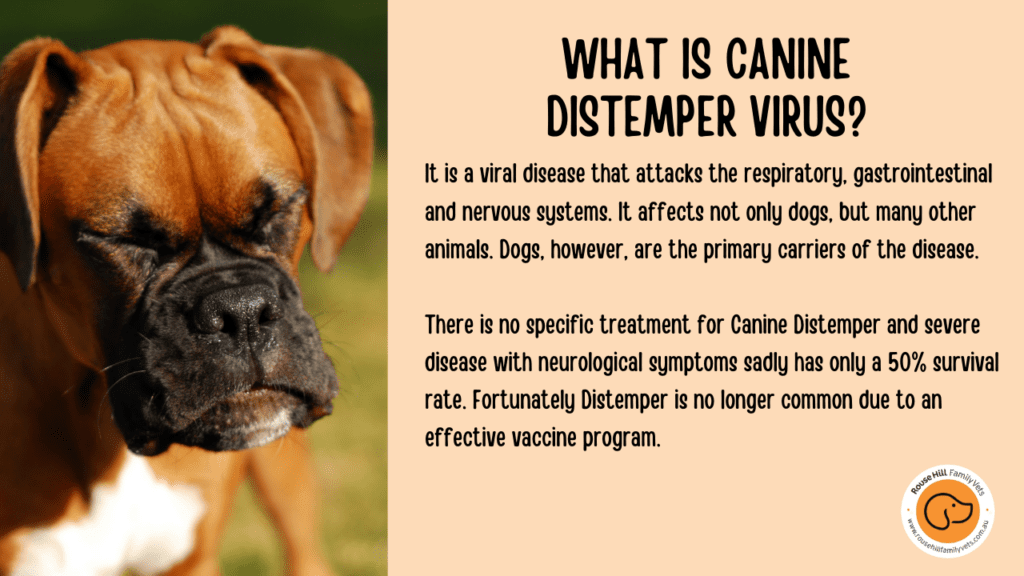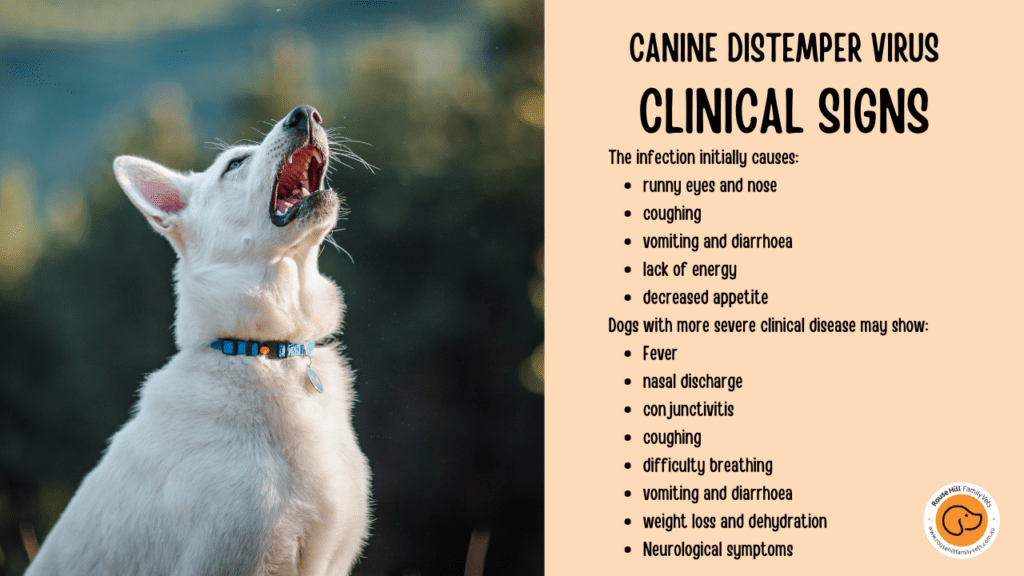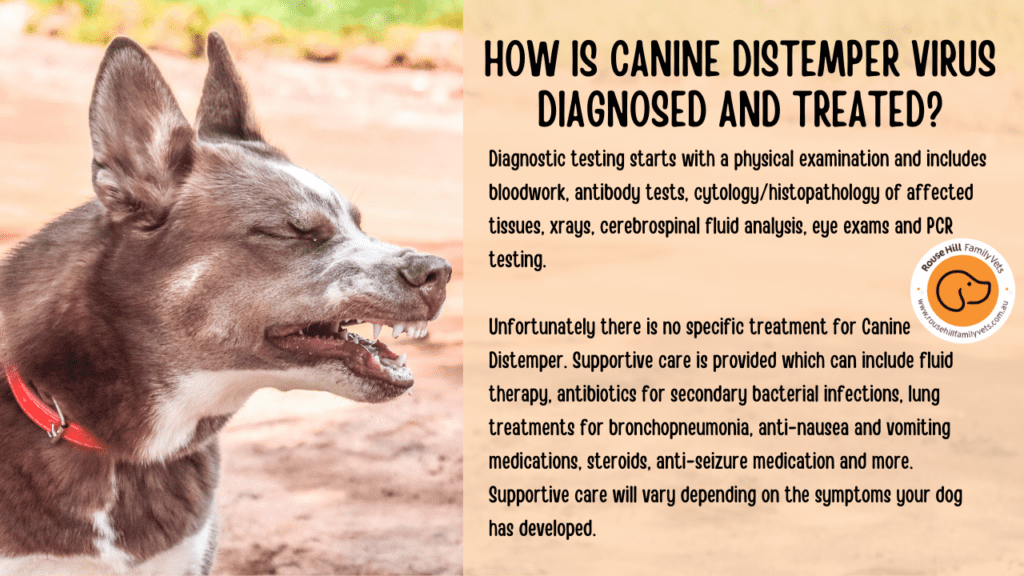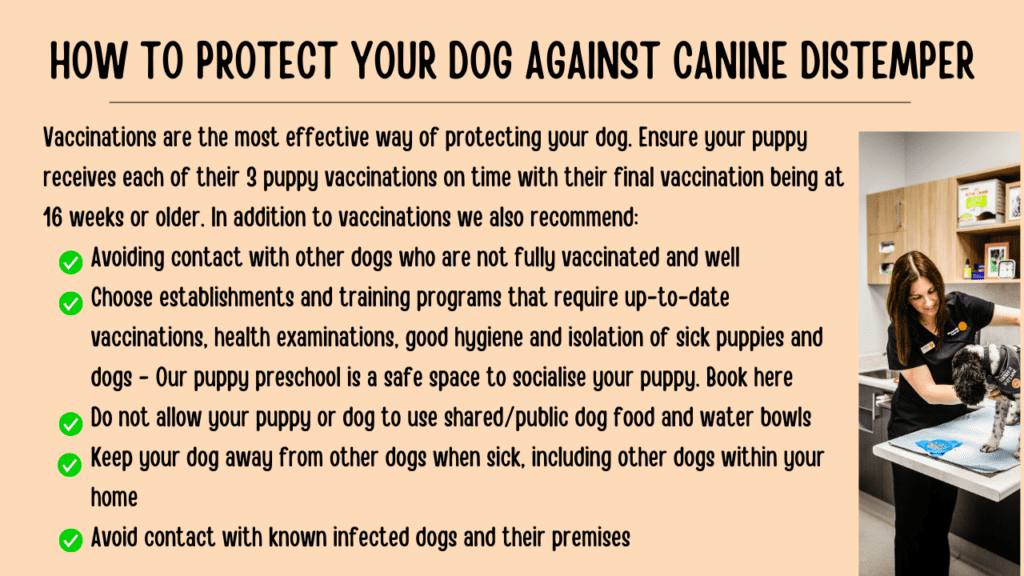
What is Canine Distemper Virus?
Canine Distemper is a viral disease that affects not only dogs, but also many other animals including cats. There is no specific treatment for Canine Distemper and severe disease with neurological symptoms sadly has only a 50% survival rate. Fortunately Distemper is no longer common due to an effective vaccine program.

What is Canine Distemper?
It is a viral disease that attacks the respiratory, gastrointestinal and nervous systems. It affects not only dogs, but many other animals. Dogs, however, are the primary carriers of the disease.
Clinical signs of canine distemper?
The infection initially causes runny eyes and nose, coughing, vomiting and diarrhoea. Dogs with mild infections may exhibit lack of energy, decreased appetite, fever, coughing, shortness of breath and nasal discharge.
Dogs with more severe clinical disease may show fever, nasal discharge, conjunctivitis, coughing, difficulty breathing, vomiting, diarrhoea, weight loss and dehydration. Secondary bacterial infections can occur and make the signs worse.
It can progress over several weeks with the development of neurological signs such as seizures, ataxia (incoordination), limb weakness, myoclonus (involuntary rhythmic muscle twitching), stiff neck and hyperesthesia (skin sensitivity). These signs can occur at the same time or up to three weeks after the onset of the infection and typically get worse over time.

How is Canine Distemper spread?
The disease is spread by direct contact with infected bodily fluids such as saliva or urine which become airborne and are inhaled by an unvaccinated dog. Canine distemper is shed in nearly all bodily fluids, with coughing and sneezing being the main way the virus is spread.
How is Canine Distemper diagnosed and treated?
Diagnostic testing starts with a physical examination and includes bloodwork, antibody tests, cytology/histopathology of affected tissues, xrays, cerebrospinal fluid analysis, eye exams and PCR testing.
Unfortunately there is no specific treatment for Canine Distemper. Supportive care is provided which can include fluid therapy, antibiotics for secondary bacterial infections, lung treatments for bronchopneumonia, anti-nausea and vomiting medications, steroids, anti-seizure medication and more. Supportive care will vary depending on the symptoms your dog has developed.
Dogs and puppies with neurological signs have a poor to guarded prognosis with only a 50% rate of survival.

How can I protect my puppy against Canine Distemper?
Vaccinations are the most effective way of protecting your dog. Ensure your puppy receives each of their 3 puppy vaccinations on time with their final vaccination being at 16 weeks or older. In addition to vaccinations we also recommend:
- Avoiding contact with other dogs who are not fully vaccinated and well
- Choose establishments and training programs that require up-to-date vaccinations, health examinations, good hygiene and isolation of sick puppies and dogs – Our puppy preschool is a safe space to socialise your puppy. Book here
- Do not allow your puppy or dog to use shared/public dog food and water bowls
- Keep your dog away from other dogs when sick, including other dogs within your home
- Avoid contact with known infected dogs and their premises

We offer puppy and dog vaccinations Monday to Saturday in our purpose built veterinary hospital in Rouse Hill, Sydney. All of our experienced veterinarians and veterinary nurses are fear free certified professionals who ensure we care for not only the physical wellbeing of your dog but also their emotional wellbeing.
For more information regarding the vaccines we offer and costing click here.

